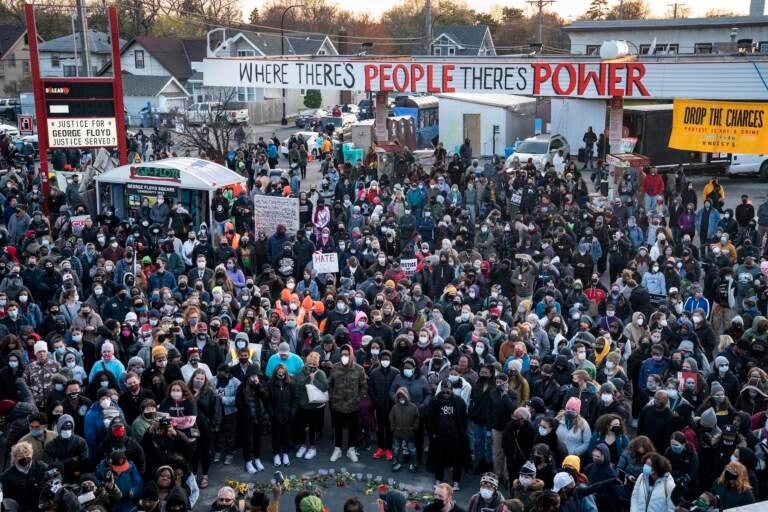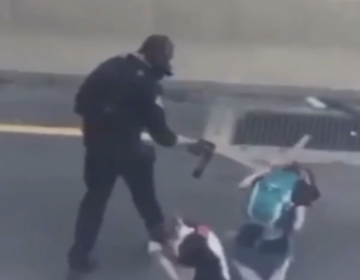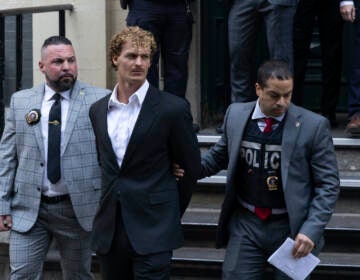On the anniversary of George Floyd’s murder, reckoning with police violence remains in limbo
Now, three years since Floyd’s murder, proponents of federal actions still await signs of change.

FILE - Demonstrators gather outside Cup Foods to celebrate the murder conviction of former Minneapolis police officer Derek Chauvin in the killing of George Floyd, April 20, 2021, in Minneapolis. The third anniversary of Floyd’s murder is Thursday, May 25, 2023. (AP Photo/John Minchillo, File)
The murder of George Floyd at the hands of Minneapolis police, and the fervent protests that erupted around the world in response, looked to many observers like the catalyst needed for a nationwide reckoning on racism in policing.
For more than nine minutes, a white officer pressed his knee to the neck of Floyd, a Black man, who gasped, “I can’t breathe,” echoing Eric Garner’s last words in 2014. Video footage of Floyd’s May 25, 2020, murder was so agonizing to watch that demands for change came from across the country.
But in the midst of the deadly coronavirus pandemic, economic uncertainty, and a divisive U.S. presidential election, 2020 ended without the kind of major police reforms that many hoped, and others feared, would come. Then, 2021 and 2022 also failed to yield much progress.
Now, three years since Floyd’s murder, proponents of federal actions — such as banning chokeholds and no-knock warrants, and changing the so-called qualified immunity protections for law enforcement — still await signs of change.
“When people casually, and I think too frequently, say that there is some sort of racial reckoning that we’re in the midst of, I see no evidence of that,” Democratic U.S. Rep. Ayanna Pressley, of Massachusetts, said during a recent press conference convened by a Black Lives Matter collective.
To be clear, racial justice activists and their champions in elected office haven’t slowed down. But the beating death of Tyre Nichols at the hands of Memphis police officers in early January underscored just how long it’s taking to achieve meaningful change.
“I don’t play with words like ‘reckoning,’” Pressley said. “That needs to be something of epic proportion. And we certainly have not seen a response to the lynching, the choking, the brutality, (and) the murder of Black lives.”
Since 2020, what has happened in Minneapolis?
Soon after Floyd’s murder, Minneapolis adopted a number of changes, including bans on chokeholds and neck restraints, and requirements that police try to stop fellow officers from using improper force. Minnesota lawmakers approved statewide police accountability packages in 2020 and in 2021, as well as tight restrictions on no-knock warrants just this month.
The city is still awaiting the results of a federal investigation into whether its police have engaged in a “pattern or practice” of unconstitutional or unlawful policing. A similar investigation by the state Department of Human Rights led to what it called a “court-enforceable settlement agreement” in March to revamp policing in the city.
The federal investigation could lead to a similar but separate agreement with the city called a consent decree. Police in several other cities already operate under such oversight for civil rights violations.
“We are shifting the culture of our police department — to ensure that our officers strengthen and hold the trust of our entire community. This work has been ongoing for the past few years and will continue for years to come,” Minneapolis Mayor Jacob Frey said in a statement Thursday. “Strengthening our community-police trust will take time. We know it’s not enough to just put pen to paper and write a new policy — the culture shift will only be real when it is truly seen and felt by the community.”
Activists say that Minneapolis has started to make critical changes, but that the work necessary to transform policing must continue.
There were also immediate cries to defund the police — and instead fund public housing, infrastructure, and mental health services. But a ballot measure that had roots in that movement failed, even in some heavily Black neighborhoods.
An AP review of police funding found that some municipalities elsewhere made modest cuts that fell far short of activists’ calls.
What’s happening in Minneapolis this week?
Minneapolis activists plan to mark the anniversary with a candlelight vigil Thursday night at George Floyd Square, the corner where Floyd died. A festival at the square Saturday will celebrate change in Minneapolis.
Gov. Tim Walz declared Thursday “George Floyd Remembrance Day” in Minnesota.
In his proclamation, he said: “True justice for George Floyd will come only through real, systemic change to prevent acts like this from happening again. … We must continue to do everything in our power to come together to deconstruct and undo generations of systemic racism in our state.”
What happened to the officers?
Derek Chauvin, the white officer who killed Floyd, and the three other officers who failed to stop Chauvin at the scene, are all in prison. Chauvin was sentenced in state court to 22 1/2 years for second-degree murder. Two of the three other officers pleaded guilty to aiding and abetting manslaughter and received shorter terms, while the third officer was convicted of that count by a judge and awaits sentencing.
Chauvin also pleaded guilty to a federal civil rights charge, admitting that keeping his knee on Floyd’s neck resulted in his death. In that case, he received a concurrent sentence of 21 years. The three others were also convicted of violating Floyd’s rights and got much shorter sentences.
What happened after protests?
Around the world, protests against racial violence and police brutality erupted after Floyd’s murder, reigniting the Black Lives Matter movement. Videos circulated on social media of U.S. police using tear gas and less-lethal munitions like rubber bullets, which fueled calls for accountability. That accountability so far has largely come in the form of civil settlements.
New York City found 146 officers had committed misconduct at protests including excessive force and violence like one officer who drove a car into protesters. Independent reviews in Philadelphia, Minneapolis and Los Angeles also found those departments had mishandled their responses.
In some cities, a handful of officers were fired. Some faced criminal charges: In Austin, Texas, 19 officers were indicted by a grand jury. But few have been convicted.
Minneapolis has agreed to millions of dollars in settlements with people who alleged they were victims of excessive police force during unrest that followed Floyd’s killing, which included the burning of a police station. But few officers faced disciplinary action.
What’s happening on the federal level?
In 2020, the George Floyd Justice In Policing Act, a piece of federal legislation, showed some signs of promise. It would ban chokeholds and no-knock warrants, like the one that enabled Louisville police to kill Breonna Taylor. It would also create a database listing officers who were disciplined for gross misconduct, among other measures.
The following year, the House passed it but the Senate failed to reach a consensus.
Last year, President Joe Biden signed an executive order that applied key elements of the bill to federal law enforcement. On Thursday, Biden he renewed his call for Congress to act in order to bring “real and lasting change at the state and local levels.”
“I urge Congress to enact meaningful police reform and send it to my desk. I will sign it,” he said in a statement. “I will continue to do everything in my power to fight for police accountability in Congress, and I remain willing to work with Republicans and Democrats alike on genuine solutions.”
Meanwhile Pressley, the Massachusetts congresswoman, has been promoting the Ending Qualified Immunity Act, a measure she has reintroduced every year since 2020.
What about the Floyd family?
Over the last three years, George Floyd’s family members have appeared at rallies and spoken out against police violence. Within days of his brother’s death, Philonise Floyd testified at a congressional hearing about police reform.
While relatives and reform advocates urged for legislation changes, George Floyd’s youngest daughter, Gianna Floyd, met Biden at the White House in 2021. A photo of a Marine holding the door for the 7-year-old went viral.
New York City-based Terrence Floyd, who became an activist after his brother’s murder, planned to hold the third-annual memorial event at a Harlem church on Thursday evening. He has supported get-out-the-vote efforts and promoted music paying tribute to his brother.
“You have to have the faith that it will happen, because it didn’t happen overnight for Martin Luther King Jr. or Malcolm X. It didn’t happen overnight for Rev. Al Sharpton and Rev. Jesse Jackson,” he said about meaningful social change. “You can’t expect it to happen overnight for us, but it will happen.”
___
Morrison reported from New York. Associated Press writers Claudia Lauer in Philadelphia and Colleen Long in Washington contributed to this report.
WHYY is your source for fact-based, in-depth journalism and information. As a nonprofit organization, we rely on financial support from readers like you. Please give today.





